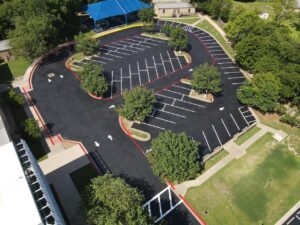 It is no secret that asphalt pavements are reasonably priced, aesthetically pleasing, and speedy to install. It is also no secret that they will need a bit of routine maintenance to achieve their full potential. Of all the maintenance procedures available, asphalt sealcoating should be high on your list, and spring is the best time to have this procedure performed.
It is no secret that asphalt pavements are reasonably priced, aesthetically pleasing, and speedy to install. It is also no secret that they will need a bit of routine maintenance to achieve their full potential. Of all the maintenance procedures available, asphalt sealcoating should be high on your list, and spring is the best time to have this procedure performed.
Table of Contents
ToggleWhat Is Asphalt Sealcoating?
Sealcoating is the process of applying a sealcoat, also known as a sealant, to an existing surface. Asphalt sealcoating contractors create a liquid mix that they apply to the pavement with a sprayer or squeegee. The particles in the sealant knit together and bond with the pavement as the sealcoat cures. The result is a hard, protective shell that helps protect the pavement from damage, but sealcoating also enhances the appearance of your pavement.
Why Is Spring the Right Time for Asphalt Sealcoating?
Sealcoating can be a tricky product to apply due to its sensitivity to environmental conditions. Manufacturers state that the ideal conditions for sealcoating include a ground temperature of around 70 degrees Fahrenheit, a relative humidity of less than 50%, and a wind velocity of around 5 mph. Furthermore, the skies should not be overcast, there can be no rain in the forecast for a three-day period starting the day before the work, and the sealant will receive at least four hours of direct sunlight. As any experienced Dallas asphalt sealcoating contractor can attest, days with ideal conditions are rare. Therefore, a sealcoating contractor must choose a day when conditions are within acceptable tolerances, and those days are more common in the springs.
What Are the Acceptable Tolerances for Dallas Sealcoating?
Most general purpose and parking lot sealcoat manufacturers provide a minimum and maximum range for some conditions, but they may state a minimum or maximum for others.
1. Temperature: The ground temperature and the air temperature must both be a minimum of 50 degrees Fahrenheit and rising. Depending on the manufacturer, the maximum ground temperature is between 90 and 95 degrees Fahrenheit. However, a competent sealcoating contractor knows a variety of ways to cool down a pavement so that work can proceed.
2. Humidity: There is no minimum acceptable humidity level; generally, the lower the relative humidity, the better it is for sealcoating parking lots and other pavements. The maximum acceptable relative humidity is typically 90%.
3. Wind: The minimum wind velocity is around 3 mph. Although most manufacturers do not provide a maximum wind speed, most asphalt sealcoating contractors prefer a wind speed of less than 10 mph or so.
4. Rain: No rain must fall during the application or for 24 hours after the application. Rain that falls the day before may or may not require a sealcoating contractor to reschedule. It depends on whether the pavement is completely dry by the time the application commences.
5. Other: Contractors must look at the combination of the first three factors. This is because all three factors affect the rate of evaporation. For example, a cool temperature, low wind, and high humidity level will significantly slow the rate of evaporation. There are additives that your contractor can include in the mix that can help regulate the rate of evaporation. For example, when sealcoating parking lots on a day when one factor is borderline, contractors may want to accelerate evaporation so that they can apply the line striping and pavement markings.
HI-TEK Paving is an asphalt paving company and we assist commercial clients throughout Dallas, Fort Worth, and the rest of the DFW metroplex. Our services include asphalt sealcoating, asphalt overlays, asphalt paving, asphalt repair, asphalt crack repair, parking lot striping, concrete installation, parking lot maintenance, and concrete repair. We have earned an exceptional reputation for superior results and exemplary service. To request a free quote, fill out the online form, email Kevin@HI-TEKPaving.com, or call 214-908-9641,
